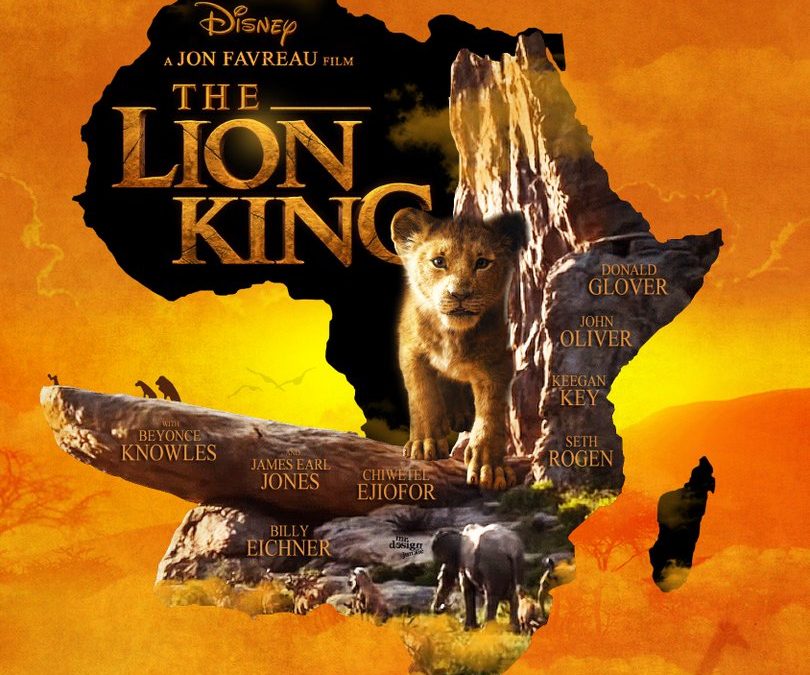By Intisar Seraaj
Let me set the scene.
There’s a steady beating of African drums tingling your ears and making your body involuntarily dance to the rhythm. The wind is crisp and hot, whispering to you of the dreams of your ancestors, inspiring your spirit. Your feet melt deeper into the warm sand dunes, sinking and softening from exfoliation by grainy caresses. Through the tall grass, you hear the playful yips of lion cubs and the fierce roars of a lion pride.
It’s Beyoncé, James Earl Jones, Donald Glover, and Alfre Woodard! This is only a portion of the star-studded cast for Disney’s new rendition of The Lion King. I can go on, but I’d be “name dropping” the whole time. The cast is full of thespian heavy hitters. Literally, everyone who’s ever watched a movie or TV show should be able to identify with an actor that they love. But if the star-studded cast, the live-action digital graphics, and the culturally-rich soundtrack aren’t enough to make you want to see it because you couldn’t care less about celebrities you don’t pay your bills, CGI that’ll never measure up to “the real thing,” or music you can just stream online, then let me tell you about a more compelling reason to support this film.
Most of us know by now that The Lion King is based on Shakespeare’s Hamlet and was inspired by the Biblical stories of Joseph and Moses—all men who had their fathers ripped away from them, two orphaned forever and only one reunited with his father. But have you thought about how the story of Simba is also a representation of a foster child’s journey in the foster care system? That might sound like thinking about the film in that way could leave you crying harder than when you first saw Mufasa die when the movie was first released in 1994, but it won’t. This is foster care story full of triumph, self-discovery, and family reunification. Let me break it down for you.
When Mufasa, the king of the pride and father of Simba (the main protagonist), dies in a stampede, he leaves little Simba technically orphaned. In some cultures and religions, if your father is deceased or not in your life, you’re an orphan.
But now you’re wondering how Simba got entangled in the foster care system when his mother Sarabi was still alive. Well, like in the real world, sometimes a family member can make a child’s life so difficult and uncomfortable that they run away or are pushed out of their family. That’s what happened when Simba’s uncle Scar manipulated the developing cub’s mind to get into trouble outside of the boundaries his parents set for him (the adventure to the elephant graveyard), when he intentionally put him in danger (siccing hyenas on Simba), and when he made Simba feel guilty for the death of his father.
If you’re familiar with foster care cases, whether from learning about them from the news or by working in human services, this is probably starting to sound familiar. But let’s go further.
We can think of Rafiki, the mystical and silly baboon who sort of serves as the community’s shaman, as Simba’s therapist. In the scene where Simba is confused about who he is and wondering if she should return home, Rafiki reminds him of who he is while imparting wisdom we could all use. Rafiki tells him that change is good, shows him that family will always live within us even if they can’t be present, and he demonstrates how we can either let the past continue to hurt us or teach us.
Then we have Timon and Pumbaa, the meerkat and warthog that find Simba malnourished and alone, nurse his back to health, teach him independent living skills like how to find grub, and integrate him into their life and community to create a blended family. They’re basically his foster parents. And just like foster parents who truly love their foster child but want the best for them, they were sad and hesitant for Simba to return home but encouraged him to go in the end.
And there we have it folks: the story of an orphaned foster child being reunited with his family after an eventful journey through the foster care system.
If you’d like to know about how to become a foster parent or how to support youth in foster care, visit www.seraajfh.com or call 877-656-2638.



